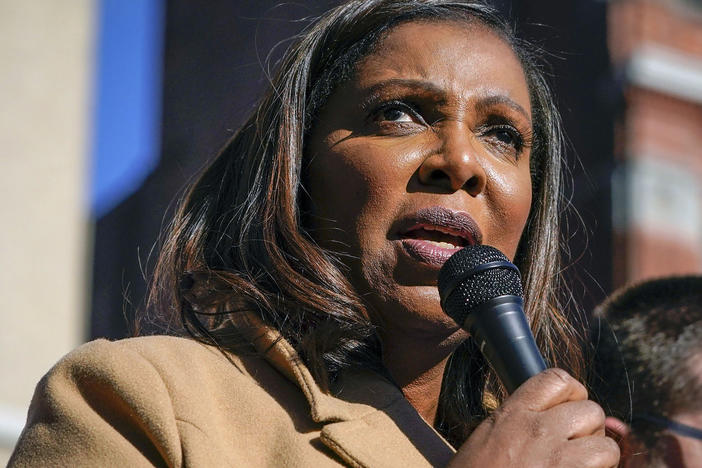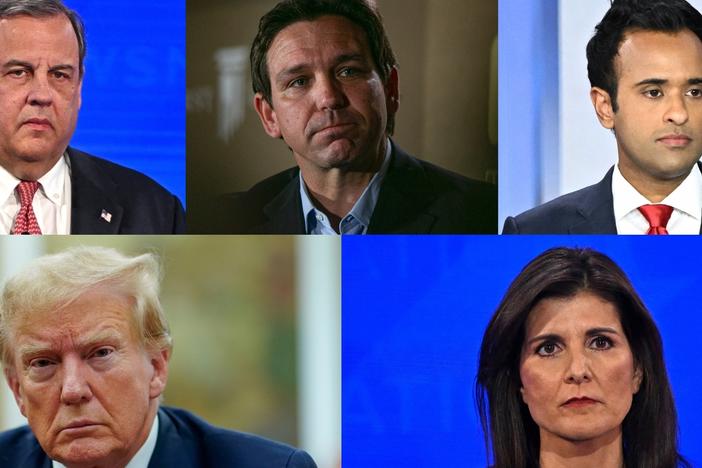Section Branding
Header Content
Families Separated At Border Hope Biden Reunites Them, Bringing Deported Parents Back
Primary Content
The Trump administration deported more than 1,400 parents without their children. President Biden has called the family separations "criminal" and pledged to create a task force to help reunite them.
Transcript
SARAH MCCAMMON, HOST:
Hundreds of migrant families separated by the Trump administration are still living apart. The children are here in the U.S. while their parents have been deported, mostly back to Central America. President Biden has called the situation criminal, and he's expected to take executive action on the issue as soon as tomorrow. NPR's Joel Rose covers immigration and joins us now. Hi, Joel.
JOEL ROSE, BYLINE: Hi, Sarah.
MCCAMMON: It's been more than two years since President Trump ended the family separation policy, at least officially. So why are so many of these families still not reunited?
ROSE: Well, there are, really, two answers to that question. First, the Trump administration separated far more children, starting much earlier than it initially acknowledged. The number now stands at more than 5,500. And second, we've learned a lot more about what a mess that policy was. Records were not kept. There was not a plan for how to reunite these families. And it's become clear that more than 1,400 parents were deported without their children.
MCCAMMON: You talked with one of these kids who was left behind, Joel. Tell us about her.
ROSE: Yeah. Darieli lives in Virginia along with her three younger sisters. She asked us not to use her last name because her asylum case is still ongoing. Darieli was 16 when the girls and their mother arrived at the U.S.-Mexico border nearly three years ago. And they crossed the Rio Grande illegally into El Paso, Texas. They were detained together in a cold Border Patrol holding cell until about 3 in the morning, when immigration officers separated the four girls from their mother.
DARIELI: (Through interpreter) I remember my little sisters were crying. Because I'm the oldest, I had to be strong. And it was very painful because they couldn't even give my mom a last hug because I was trying to protect my sisters.
ROSE: That was in May of 2018. Darieli's mother spent more than 40 days in federal prison before she was deported back to Honduras. The girls were sent to a shelter before being released to their father in Virginia, whom they had not seen in several years. Darieli is 19 now. She's a junior in high school. She works part time at a restaurant. And she's still trying to protect her younger sisters.
DARIELI: (Through interpreter) It's hard to play a role that doesn't belong to you. I've learned a lot about life. I've had to give advice when I myself still need advice.
ROSE: There are hundreds of families like Darieli's that are still caught up in this long, fraught chapter of U.S. immigration policy. In a largely symbolic move, the Biden administration formally rescinded the zero-tolerance policy that led to family separation. The Trump administration had mostly stopped separating families back in 2018, and it did reunite thousands of them after it was ordered to do so by a judge. But that work is far from done. Immigrant advocates are still searching for hundreds of parents, many of whom were deported. There are more than 600 separated parents they haven't been able to reach and hundreds more who have been located but still are not reunited with their kids.
JUANA: (Through interpreter) It was the hardest moment, the hardest thing I've ever lived. They took them, and I just didn't know where. I didn't see them again.
ROSE: This is Darieli's mother, Juana. We're not using her full name either because she's back in Honduras, the same country she fled to escape from a man who she says threatened her life and her family. She lives alone in a shelter.
JUANA: (Through interpreter) Truthfully, I never go outside. I just go sometimes when I have to buy something. But I avoid going outside because of my safety. I can't be by myself because in this country where we are, there's no security, no nothing.
CAROL ANNE DONOHOE: The deported parents are kind of lost in the story.
ROSE: Carol Anne Donohoe is with Al Otro Lado, a nonprofit that's working to reunite these parents with their kids.
DONOHOE: Not only were they separated (laughter), they were deported back to the country they fled. They haven't seen their children in three years now. And there's no clear pathway to get them back.
ROSE: The Trump administration offered to transport some of these children back to their home countries, but it has refused to allow parents into the U.S. to reunite with their children here. Now all eyes are on President Biden.
(SOUNDBITE OF ARCHIVED RECORDING)
JOE BIDEN: Parents were ripped - their kids were ripped from their arms and separated.
ROSE: Here's Biden during one of the presidential debates last year.
(SOUNDBITE OF ARCHIVED RECORDING)
BIDEN: It's criminal. It's criminal.
ROSE: Biden has promised to appoint a task force to help reunite these separated families. Among those watching will be hundreds of children living with foster families or relatives in the U.S., children like Darieli and her sisters, who hope their family will someday be reunited here.
DARIELI: (Through interpreter) I try not to complain. I know I have a lot of opportunities. And at least I'm not at risk here. I just need my mom. That's all I need so I can feel complete again.
MCCAMMON: And Joel, you're back with us in the studio. What exactly do we know about this task force the Biden administration is expected to announce to try to address this?
ROSE: Well, immigration lawyers will be looking to see exactly what the executive action says. Will it simply provide help finding the parents who have not been located, or will this task force go further than that? For example, will it have a mandate to reunite these families and allow them to live in the U.S.? Will it look at holding accountable the Trump administration officials who designed the family separation policy? I talked to Lee Gelernt at the ACLU, who has been fighting the prior administration in court over family separation for years.
LEE GELERNT: The least we can do is allow them to come back to the United States, remain here safely, be given some legal status. And there needs to be some restitution.
MCCAMMON: Can the Biden administration let these immigrants back into the country?
ROSE: Well, it could. But that would mean, essentially, opening the door to allowing hundreds of migrant parents, many of whom crossed the border illegally to ask for asylum. And that is sure to anger immigration hardliners. And there could be a political cost to doing that at a moment when President Biden is talking about finding bipartisan solutions with Republicans in Congress. But immigrants and their advocates say that's the only way to right this historic wrong of family separation.
MCCAMMON: Joel Rose covers immigration for NPR. Joel, thanks for your reporting.
ROSE: You're welcome.
(SOUNDBITE OF LEGENDARY SKIES' "ALEUTIAN") Transcript provided by NPR, Copyright NPR.
Bottom Content



